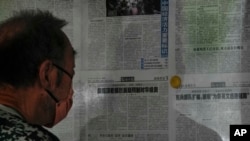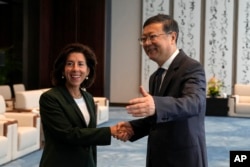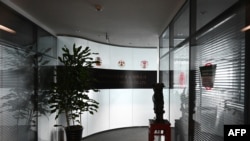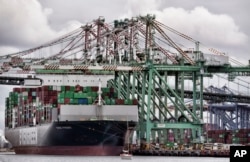Chinese leaders, worried by a wave of discouraging economic reports, have been appealing for foreign investors to remain in or return to China even as Western officials point out that it is Beijing’s own policies that are driving investors away.
August saw a flurry of Chinese trade officials talking to state media about the government’s commitment to “improve foreign investment environment” and “spare no effort in keeping foreign capital onshore.”
These proclamations followed a July 24 meeting of the 24-member Communist Party Politburo chaired by party General Secretary Xi Jinping, where a broad slowdown in the Chinese economy was discussed.
According to a report on the meeting in the state-controlled People’s Daily, admonitions to boost domestic consumption and foster employment were accompanied by instructions to ensure “the essentials of foreign trade and foreign investment remain steady.”
Leaders of the Chinese Communist Party (CCP) have good reason to be concerned. A report published by Chinese state media in August 2021 quoted Minister of Commerce Wang Wentao as saying that companies with foreign investment have generated “40 million jobs in China, equal to 10% of the work force,” and have contributed one-sixth of the government’s total tax income.
But Nikkei Asia reported last month that foreign direct investment (FDI) in China fell to its lowest level on record in the second quarter of this year. Bloomberg said one measure of FDI had hit a 25-year low in the April-June quarter.
'Commentaries'
What looks like a campaign to safeguard the essentials of foreign trade and investment kicked into full gear on August 13 with the publication of a set of “commentaries” issued by the State Council on what it thinks ought to be done to “further improve foreign investment environment and attract additional foreign investment.”
“No effort shall be spared,” the commentaries stated.
Nine days after that, Beijing announced that the U.S. had removed 27 Chinese entities from a U.S. export control list and that Secretary of Commerce Gina Raimondo would visit Beijing August 27-30.
During her visit, Raimondo appeared to have struck a friendly tone with her Chinese counterparts and was quoted by CNN as having encouraged U.S. businesses in Shanghai to “continue to do what you’re doing.” When she faced traveling media, however, Raimondo struck a different tone.
“Increasingly I hear from businesses, ‘China is uninvestible because it’s become too risky,’” Raimondo told reporters aboard a high-speed train from Beijing to Shanghai.
Earlier, a senior fellow at the American Enterprise Institute pointed out in an article for in The Wall Street Journal that foreign businesses are having difficulty in obtaining insurance policies that cover political risks for their China ventures.
The insurance firms are drawing back because of fears that range “from political interference in companies’ operation all the way up to war with Taiwan,” Elisabeth Braw told VOA’s Mandarin Service in a subsequent interview.
Raimondo, in her remarks to reporters, said factors scaring off American companies included China’s newly implemented anti-espionage laws and “fines” levied against companies doing business there.
Mintz Group
Shortly before Raimondo’s trip, reports emerged that Mintz Group, an American research consultancy firm with offices in North and South America, Europe and Asia, had been fined $1.5 million for engaging in research that Chinese authorities had not approved in advance.
In March, Mintz Group confirmed that Chinese authorities had detained the five staff members in its Beijing office and that the company’s operations there had been shut down. Reuters reported that the raid took place on March 20, and that the employees were being held incommunicado at locations outside Beijing.
On July 5, Beijing authorities announced the seizure of $730,000 that Mintz Group had earned "illegally" and said the company had been fined an equal amount.
Anders Corr, editor of The Journal of Political Risk, told VOA in a written interview that the apparent contradiction between China’s outreach to foreign investors and the crackdown on foreign companies reflected fault lines within the Chinese leadership itself.
While some pro-business officials are “attempting to put the best face on a negative investment environment for Westerners … everybody knows that the pro-business faction is not calling the shots, and he who is calling the shots is anti-capitalist and anti-Western,” wrote Corr, whose book The Concentration of Power warns of the dangers of power in the hands of illiberal governments.
“Yes, Xi wants both [Chinese Communist Party] expansion and FDI, but he clearly is prioritizing power expansion … and therefore FDI is looking for safer outlets,” Corr said.
Keith Krach, who served as the U.S. undersecretary of state for economic growth, energy and the environment from 2019 to 2021, told VOA in a written interview that the shine is off the Chinese market for a growing number of CEOs.
"Too many of them have been scarred by the communist system’s lawlessness, including industrial theft, forced technology transfer, corruption, cyberattacks and difficulty getting their earnings out of the country, among other complications,” he said.
Krach, who founded the tech diplomacy institute at Purdue University, added that international companies “understand that if Xi pulls a Putin and invades Taiwan, the fallout — especially on retirement security and the high-tech sector — would be catastrophic.”
Caution urged
Billionaire U.S. investor Mark Mobius, who has been described as “the godfather of emerging markets,” said in March that he couldn’t take his money out of China because of the country’s capital controls, even though he has a bank account in Shanghai. In an interview with Fox Business, Mobius cautioned investors to be “very, very careful” about investing in an economy that is under a tight government grip.
“It is a mistake to fancy that foreign companies can escape the government’s harsh tactics aimed at preserving their sense of ‘order,’ which is in fact their grasp of power and control of the whole society,” said Wei Jingsheng, one of China’s best-known dissidents, in a phone interview with VOA.
The Chinese government has made it clear repeatedly that weiwen (maintaining stability), which Wei calls a euphemism for cracking down on dissent, is its highest priority, Wei and others point out.
“Normal business operates under the protection of rule of law, but there’s no genuine rule of law in China, where rule by men can override laws and regulations at any time,” Wei said. “Compared to their own safety concerns, tax breaks and other material measures to entice foreign entities to stay in China appear trivial.”
Patrick A. Mulloy, a former U.S. trade official, said a changing political atmosphere in the United States is causing American businesses to think twice about their footprint in China.
Mulloy currently serves as a board advisor to the Coalition for a Prosperous America (CPA). The organization was founded in 2007 by a group of American farmers, ranchers, manufacturers and labor representatives, working together to rebuild the American work force and overall economy.
“The fact that people from both parties are talking about it now and getting a good reaction suggests that people understand [the U.S.-China relationship] has not been good for them,” added Mulloy, who served five two-year terms at the U.S.-China Economic and Security Review Commission.
“I imagine [corporations] are concerned that their profits are not as high as they used to be, and the fact that they might get a bad reputation in the United States” for fostering economic ties that have cost millions of U.S. manufacturing jobs and created a huge trade imbalance in China’s favor, Mulloy said in a phone interview.
U.S. government data issued by the Bureau of Economic Analysis show that out of the roughly $700 billion trade between the United States and China in 2022, about $153.8 billion, or less than 25%, was U.S. exports to China, while about $536.8 billion, or more than 75%, was U.S. imports from China, resulting in a U.S. trade deficit of $382.9 billion, an increase of $29.4 billion from 2021.
A survey by the American Chamber of Commerce in China echoed Mulloy’s observation that changing public attitudes at home are playing a significant role in businesses’ calculation. Two-thirds of the more than 300 member companies polled by AmCham said U.S.-China tensions were the top factor when it comes to risks in doing business in China.
VOA's Mandarin Service contributed to this report.









